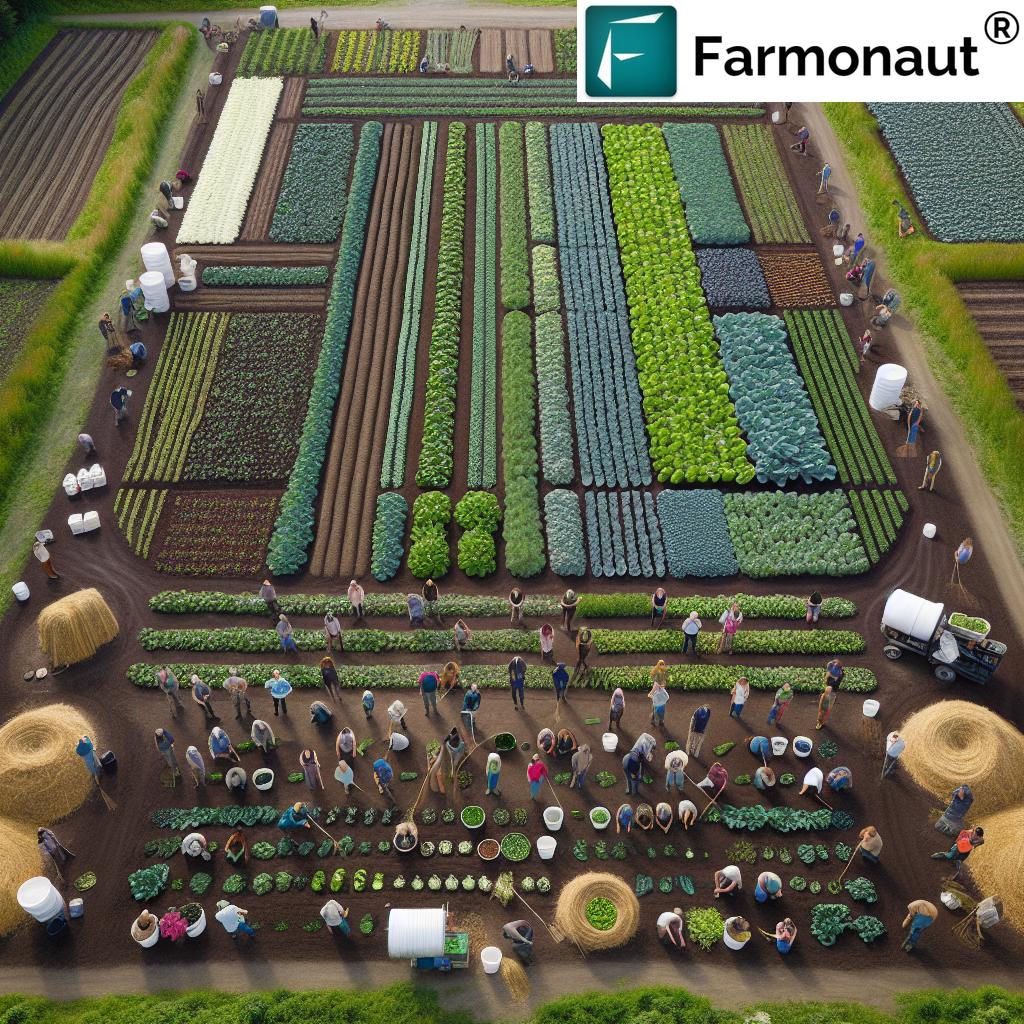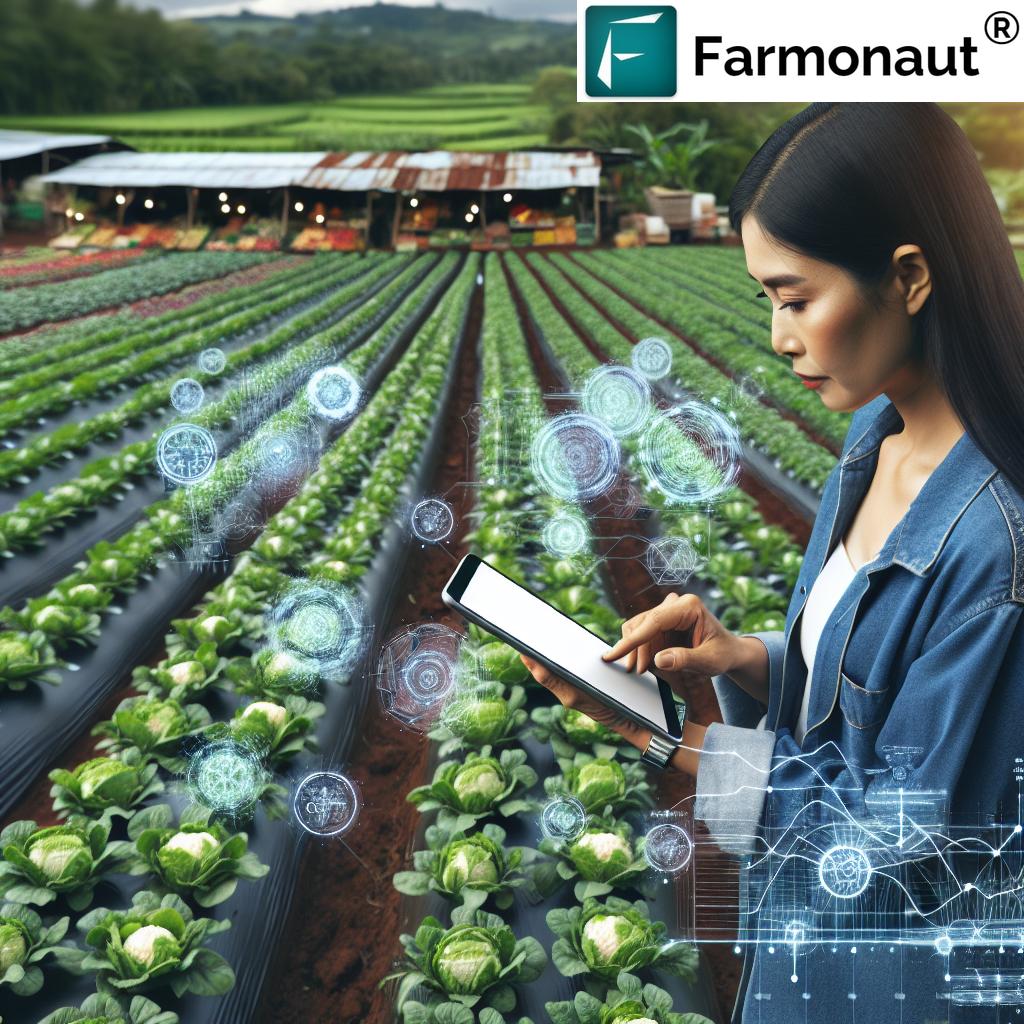Revolutionizing Chicago Farms: Farmonaut’s Sustainable Agriculture Techniques for Local Food Production
“A 30-acre farm in Massachusetts employs sustainable practices like crop rotation and cover crops to boost organic yields.”
In the heart of Chicago, a green revolution is taking root. As we delve into the world of sustainable agriculture and local food production, we’re witnessing a remarkable transformation in how our city farms. At the forefront of this change is Farmonaut, a pioneering agricultural technology company that’s reshaping the landscape of urban farming with its innovative satellite-based farm management solutions.
The Dawn of Sustainable Farming in Chicago
Chicago, known for its towering skyscrapers and bustling streets, is now embracing a new identity as a hub for sustainable agriculture. This shift isn’t just about growing food; it’s about nurturing a healthier community and environment. We’re seeing a surge in local initiatives that champion organic farming techniques and community-supported agriculture (CSA) programs.
One such initiative that caught our attention recently took place in Massachusetts, where volunteers gathered at a 30-acre farm to support sustainable agriculture practices. This event showcased the power of community engagement in advancing environmentally friendly farming methods.

Farmonaut: Bridging Technology and Sustainable Agriculture
In this evolving landscape, Farmonaut stands out as a game-changer. By leveraging advanced satellite technology, artificial intelligence, and data-driven insights, Farmonaut is making precision agriculture accessible and affordable to farmers across Chicago and beyond.
Let’s explore how Farmonaut’s innovative solutions are contributing to the sustainable agriculture movement in Chicago:
- Satellite-Based Crop Health Monitoring: Farmonaut’s platform uses multispectral satellite images to provide real-time insights into crop health. This technology allows Chicago farmers to monitor vegetation health (NDVI), soil moisture levels, and other critical metrics, enabling them to make informed decisions about irrigation, fertilizer usage, and pest management.
- AI-Powered Advisory System: The Jeevn AI advisory system offers personalized farm management strategies, weather forecasts, and expert advice. This AI-driven tool analyzes satellite data to generate customized recommendations, helping Chicago farmers improve their productivity and efficiency.
- Blockchain-Based Traceability: Farmonaut’s blockchain integration ensures transparency and security in the food supply chain. This feature is particularly valuable for Chicago’s local food markets, enhancing trust between producers and consumers.
- Resource Management Tools: Efficient resource management is crucial for sustainable farming. Farmonaut provides tools for fleet management and carbon footprint tracking, helping Chicago’s agribusinesses optimize their operations and reduce their environmental impact.
To experience these innovative features firsthand, Chicago farmers can access Farmonaut’s services through their web application or mobile apps available for Android and iOS devices.



Sustainable Agriculture Practices in Action
“Community volunteers accelerated farm work by participating in essential tasks like weeding, harvesting, and watering fields.”
The recent volunteer initiative in Massachusetts serves as an inspiring example of how community engagement can drive sustainable agriculture forward. Let’s break down some of the key sustainable farming techniques observed and how they align with Farmonaut’s mission:
- Crop Rotation: This practice involves changing the type of crops grown in a particular area each season. It helps maintain soil health, reduce pest problems, and optimize nutrient use. Farmonaut’s satellite monitoring can assist in planning and tracking crop rotation patterns effectively.
- Cover Crops: Planting cover crops between growing seasons protects and enriches the soil. Farmonaut’s vegetation health monitoring can help farmers assess the effectiveness of their cover crop strategies.
- Soil Enrichment: Instead of relying on chemical fertilizers, sustainable farms focus on natural soil enrichment methods. Farmonaut’s soil moisture monitoring can guide farmers in maintaining optimal soil conditions.
- Organic Pest Management: Sustainable farms avoid chemical pesticides, opting for natural pest control methods. Farmonaut’s AI advisory system can provide insights on integrated pest management strategies based on real-time crop health data.
The Impact of Sustainable Farming on Chicago’s Local Food Scene
The adoption of sustainable agriculture practices, supported by Farmonaut’s technology, is having a profound impact on Chicago’s local food production:
- Increased Crop Yields: By optimizing resource use and improving crop health monitoring, Chicago farms are seeing higher yields of organic produce.
- Diversified Crop Selection: Sustainable farming practices encourage crop diversity. Chicago farmers are now growing a wider variety of fruits and vegetables, including unique varieties like kohlrabi and bok choy.
- Strengthened Local Food Systems: With improved production and traceability, Chicago’s farmers markets and CSA programs are flourishing, connecting consumers directly with local, sustainably grown produce.
- Environmental Benefits: Reduced use of chemical inputs and improved soil health contribute to a healthier ecosystem in and around Chicago.

Community Engagement and Education
The success of sustainable agriculture in Chicago isn’t just about farming techniques; it’s also about community involvement and education. Here’s how Farmonaut and local initiatives are fostering a deeper understanding of sustainable food systems:
- Volunteer Programs: Following the example set in Massachusetts, Chicago farms are organizing volunteer days where community members can participate in farm activities and learn about sustainable practices firsthand.
- Educational Workshops: Farmonaut contributes to environmental education by offering workshops on interpreting satellite data for agriculture, helping farmers and students understand the technology behind precision farming.
- School Garden Programs: Many Chicago schools are implementing garden programs, using Farmonaut’s user-friendly tools to teach students about crop growth and sustainable agriculture.
- Community Supported Agriculture (CSA) Programs: These programs not only provide fresh, local produce to Chicago residents but also educate them about seasonal eating and sustainable farming practices.
The Future of Sustainable Agriculture in Chicago
As we look to the future, the potential for sustainable agriculture in Chicago is immense. With Farmonaut’s continuous innovation and the growing community support for local, organic produce, we anticipate several exciting developments:
- Urban Farming Expansion: More vacant lots and rooftops in Chicago could be transformed into productive urban farms, guided by Farmonaut’s precision agriculture tools.
- Advanced Crop Forecasting: Farmonaut’s AI and satellite technology will enable more accurate crop yield predictions, helping to balance supply and demand in local food markets.
- Increased Adoption of Sustainable Practices: As the benefits become more evident, we expect to see a wider adoption of sustainable farming techniques across Chicago’s agricultural sector.
- Enhanced Food Security: By strengthening local food production, Chicago can improve its food security and reduce dependency on long-distance food transportation.
For developers and businesses interested in integrating Farmonaut’s technology into their own systems, the company offers an API with comprehensive documentation.
Comparison: Traditional vs. Sustainable Farming Practices in Chicago
| Farming Aspect | Traditional Methods | Sustainable Practices (Supported by Farmonaut) |
|---|---|---|
| Pest Control | Chemical pesticides | Integrated pest management, monitored by Farmonaut’s AI advisory system |
| Soil Management | Synthetic fertilizers | Cover crops, crop rotation, tracked by Farmonaut’s soil health monitoring |
| Water Usage | Estimated 100 gallons/acre | Optimized irrigation (est. 60 gallons/acre) guided by Farmonaut’s moisture sensors |
| Crop Monitoring | Manual field inspections | Real-time satellite monitoring provided by Farmonaut |
| Yield Prediction | Based on historical data | AI-driven forecasts using Farmonaut’s data analytics |
| Community Involvement | Limited | Active engagement through CSA programs and volunteer initiatives |
Embracing Sustainable Agriculture with Farmonaut
As we’ve explored throughout this article, the future of farming in Chicago is bright, sustainable, and technologically advanced. Farmonaut’s innovative solutions are playing a crucial role in this transformation, making precision agriculture accessible to farms of all sizes across the city.
By embracing these sustainable practices and leveraging Farmonaut’s technology, Chicago’s farmers are not only producing healthier, more abundant crops but also contributing to a more sustainable and resilient food system for our city.
Whether you’re a farmer looking to optimize your operations, a developer interested in agricultural technology, or a consumer passionate about supporting local, sustainable food production, Farmonaut offers tools and insights to help you participate in this exciting agricultural revolution.
Join the Sustainable Farming Movement with Farmonaut
Ready to be part of Chicago’s sustainable agriculture revolution? Explore Farmonaut’s subscription options to find the perfect plan for your farming needs:
Frequently Asked Questions
Q: How does Farmonaut’s technology benefit small-scale farmers in Chicago?
A: Farmonaut’s affordable satellite-based solutions provide small-scale farmers with access to precision agriculture tools, helping them optimize crop health, reduce resource usage, and increase yields without significant upfront investment.
Q: Can Farmonaut’s system be used for urban farming initiatives in Chicago?
A: Absolutely! Farmonaut’s technology is scalable and can be applied to urban farming projects of various sizes, from rooftop gardens to community plots, helping maximize productivity in limited urban spaces.
Q: How does Farmonaut contribute to reducing the environmental impact of farming?
A: By providing precise data on crop needs, Farmonaut helps farmers minimize the use of water, fertilizers, and pesticides. This leads to more sustainable practices and reduced environmental impact.
Q: Is Farmonaut’s technology compatible with organic farming practices?
A: Yes, Farmonaut’s solutions are ideal for organic farming. The platform provides insights that support natural pest management, soil health maintenance, and other organic farming techniques without relying on synthetic inputs.
Q: How can consumers in Chicago benefit from farms using Farmonaut’s technology?
A: Consumers benefit from increased access to fresh, locally grown produce. Farmonaut’s traceability features also provide transparency about how and where their food is grown, fostering trust in the local food system.
As we conclude our exploration of sustainable agriculture in Chicago, it’s clear that the fusion of traditional farming wisdom with cutting-edge technology offered by companies like Farmonaut is paving the way for a more sustainable and productive future. By embracing these innovative approaches, Chicago is not just feeding its population but nurturing a healthier, more sustainable urban ecosystem.
We encourage all Chicago farmers, from urban gardeners to large-scale producers, to explore how Farmonaut’s solutions can enhance their sustainable farming practices. Together, we can cultivate a greener, more sustainable Chicago, one farm at a time.



